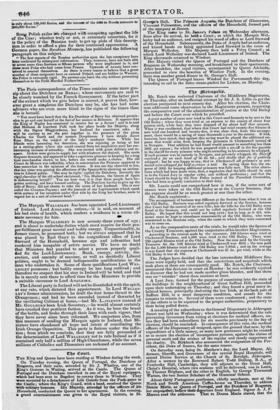The Paris correspondence of the Times contains some more gos-
sip about the Dutchess DE BERRI; whose movements are said to be closely watched by the French Government. If the latter part of the extract which we give below is correct, it proves that, how- ever great a simpleton the Dutchess may be, she has had some Advisers who are even more blind to the signs of the times than she is herself.
"You musthave heard that the Ex-Dutchess of Berry has obtained permis- sion to go and cast herself at the feet of her seniors in Bohemia. It appears that the King of Naples has consented to receive her as a favour! and it is said that Madame de Lucchesi Palli took her place beside his Majesty, along with the Signor Maggiordomo, her husband for conscience sake. It will be curious to see the pair together in the presence of the pious Charles the Tenth and the austere Dauphiness. I have details direct from Blaye on the subject of the lady's residence there. While her Mends were lamenting her detention, she was rejoicing at being at last in a resting-place where she could conceal from too inquisitive eyes her em- barrassing increase of rotundity. She was treated with great delicacy and re- spect. Orders were given to supply her with whatever she desired. She made frequent demands, and appeared to take a capricious pleasure in keeping for a long time merchandise shown to her, before she would make a choice. The old Count de Menars was inflexible, when in conversation the Princess appeared to lean somewhat to the opinions of the times. It was one day observed to her, that her sister was gaining the affections of the Spaniards by showing an inclina- tion to Liberal policy. She may be right,' replied the Dutchess. Instantly the rigid chevalier of the old school exclaimed, No, Madame, the Queen of Spain is dishonouring herself!' You see how true it is that these people have for- gotten nothing, and have learned nothing. The Dutchess having to give up the title of Berry, did not choose to take the name of her husband. She is now called the Countess Payana; and the journals of our Legitimatists which speak with ecstacy of her reception under that title by the King her brother, seem to regard her as a sort of crowned head."
















 Previous page
Previous page